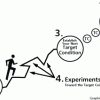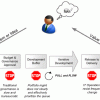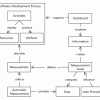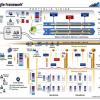Strategic advice to leverage new technologies
Technology is at the heart of nearly every enterprise, enabling new business models and strategies, and serving as the catalyst to industry convergence. Leveraging the right technology can improve business outcomes, providing intelligence and insights that help you make more informed and accurate decisions. From finding patterns in data through data science, to curating relevant insights with data analytics, to the predictive abilities and innumerable applications of AI, to solving challenging business problems with ML, NLP, and knowledge graphs, technology has brought decision-making to a more intelligent level. Keep pace with the technology trends, opportunities, applications, and real-world use cases that will move your organization closer to its transformation and business goals.
Recently Published
As a method for practicing continuous improvement on a day-to-day basis, the improvement kata complements Agile methods and integrates with familiar Lean tools.
This article shows how Agile is attempting to scale from a small, inwardly focused, team-based set of tools to an organizationally inclusive set of tools. The article asserts that Lean is a necessary adjunct to Agile ideas in order to operate at scale, particularly the Lean concept of the value stream. (Not a client? Download your complimentary copy of this article now.)
Scrum is not about planning! It is also not about story points nor sprint commitment nor backlog grooming. Scrum is about delivery in the first place, and about learning in the second.
Agile Lifecycles, Fragile Expectations
As Agile methodologies become increasingly embedded in corporate software development, it becomes necessary to look more closely at how they are integrated into the environment.
Metrics for Business Processes
Measurement is not a new concept. We deal with measurement in some form or another in our daily lives. When talking about metrics for business processes, we can sum up the concept with this well-known statement: "You cannot manage what you cannot measure. And you cannot improve something that you cannot manage properly."
Privacy is about to collide with big data. We are seeing some of the opening moves in different areas across the globe. In Europe, Google Maps has been criticized for portraying unauthorized images of people in street views. More recently in the US, we have seen the collapse of talks about use of facial recognition, where privacy advocate groups walked out of regulatory discussions because companies refused to acknowledge a need for prior permission if images were to be used for this purpose.
12 Compelling Value Propositions for EA
An ongoing issue with enterprise architecture (EA) is how to make a compelling case for its value with business decision makers and stakeholders. This Executive Report positions EA as the inclusive, pervasive, joined-up view of the enterprise and explores 12 areas where EA can deliver unique value. The report expresses these benefits in terms that executives readily understand and appreciate. We cover the potential and real impact of EA on cost, revenue, time to market, brand image, regulatory compliance, and other issues that occupy the attention of senior management.















